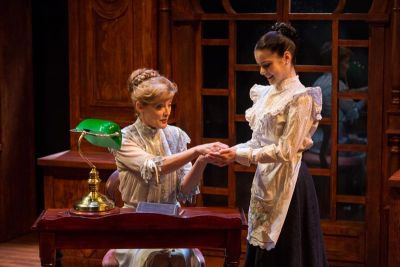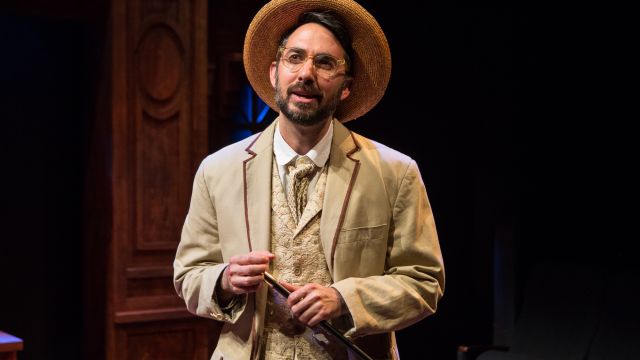The Good Doctor
In The Good Doctor Neil Simon uses several works by Chekhov to create a series of short plays linked by a conversation between the writer – obviously based on Chekov himself– and the audience. The stories – vignettes really – are typical Chekhovian insights into the Russia of his time. The way they are brought to the stage is typical Simon: clearly drawn characters and witty dialogue that relies for effect on good timing and creative direction.
Both are evident in this production, despite an unfortunate accident that could have led to chaos. Glenn Hazeldine, who was playing the pivotal role of ‘the writer’ – and three other roles – was hospitalized due to an accident six days before opening night – in fact, the day before the ‘tech’ rehearsal and two days before the first preview. A nightmare for any production – especially as it is director Sandra Bates’ final production as the Ensemble’s Artistic Director.
Fortunately Adriano Cappelletta was available and prepared to take on the mammoth task of filling Hazeldine’s large and very experienced shoes. Bates sang both their praises loudly on opening night – and, to his great credit, Glenn Hazeldine, broken collarbone firmly set, was there in the audience to lend his support.
 Though still relying on the script for some of the weighty monologues, Cappelletta does a sterling job as ‘the writer’. He is engaging, very funny and moves around the stage with elegant pace. He is script-free in the three scenes where he plays other characters. In one of these, toothache affected, he plays a sexton who is ‘attacked’ by a less than benevolent dentist! As he and the dentist (Nathan Wilson) writhe about the stage, it is hard to believe that they have perfected the choreography and timing of this scene in such a short time.
Though still relying on the script for some of the weighty monologues, Cappelletta does a sterling job as ‘the writer’. He is engaging, very funny and moves around the stage with elegant pace. He is script-free in the three scenes where he plays other characters. In one of these, toothache affected, he plays a sexton who is ‘attacked’ by a less than benevolent dentist! As he and the dentist (Nathan Wilson) writhe about the stage, it is hard to believe that they have perfected the choreography and timing of this scene in such a short time.
From writer/narrator to suffering sexton to lecherous seducer to presumptive parent, Cappelletto has been able to ‘nail’ the style and pace required for the production – and do it very confidently.
Some of that confidence must emanate from the support and experience of Bates, her crew and her cast – David Lynch, Kate Raison, Chloe Bayliss and Nathan Wilson – who have had to adapt to the many changes that occurred with both blocking and staging. And to her assistant director Erica Lovell, who took on the task of moving furniture (formerly part of Hazeldine’s blocking and not possible for Cappelletto while still holding a script!).
 David Lynch plays the ‘older’ male characters with true Chekhovian style. His pompous General is sufficiently haughty and self-contained, his Policemen blustering and his Banker suitably harassed - but it is as the elderly widower in the short, gentle scene Too Late for Happiness that he really shines. He depicts the character’s sad lack of self-confidence with tender understatement and tenuousness.
David Lynch plays the ‘older’ male characters with true Chekhovian style. His pompous General is sufficiently haughty and self-contained, his Policemen blustering and his Banker suitably harassed - but it is as the elderly widower in the short, gentle scene Too Late for Happiness that he really shines. He depicts the character’s sad lack of self-confidence with tender understatement and tenuousness.
Kate Raison wears the Russian characters as elegantly as she wears the costumes of the period. She is stiff and proud as the wife of a general, imperious as the mistress in the scene The Governess, similarly tenuous opposite Lynch as a lonely widow and contrastingly shrewish as a sharp-tongued, peevish harridan.
Chloe Bayliss plays five different young women with quiet aplomb. She is an ambitious wife, a wife tempted to adultery, an aspiring actress and a prostitute – but once again it is in the less provocative, but more empathetic role of a shy, young governess, that she is most impressive.
 Nathan Wilson plays a variety of young men, all requiring sustained energy and a range of emotions. He is suitably shy and reticent as his father introduces him to a prostitute, stupidly over-confident as a tramp pretending to drown himself to make money and threateningly aggressive as an apprentice dentist. In the first ‘story’ he plays a lowly public servant who sneezes on his boss. Here Wilson goes through a gamut of reactions with energy and growing pace.
Nathan Wilson plays a variety of young men, all requiring sustained energy and a range of emotions. He is suitably shy and reticent as his father introduces him to a prostitute, stupidly over-confident as a tramp pretending to drown himself to make money and threateningly aggressive as an apprentice dentist. In the first ‘story’ he plays a lowly public servant who sneezes on his boss. Here Wilson goes through a gamut of reactions with energy and growing pace.
Considering the turmoil leading up to opening night, the production sustains a fast pace, pushed along by Cappelletto himself and Simon’s usual asides and wisecracks. It’s entertaining and funny – just what most audiences are seeking at this time of year – and a credit to what Sandra Bates calls the close and committed ‘family’ that is the Ensemble.
Carol Wimmer
Photographer: Clare Hawley
Subscribe to our E-Newsletter, buy our latest print edition or find a Performing Arts book at Book Nook.

